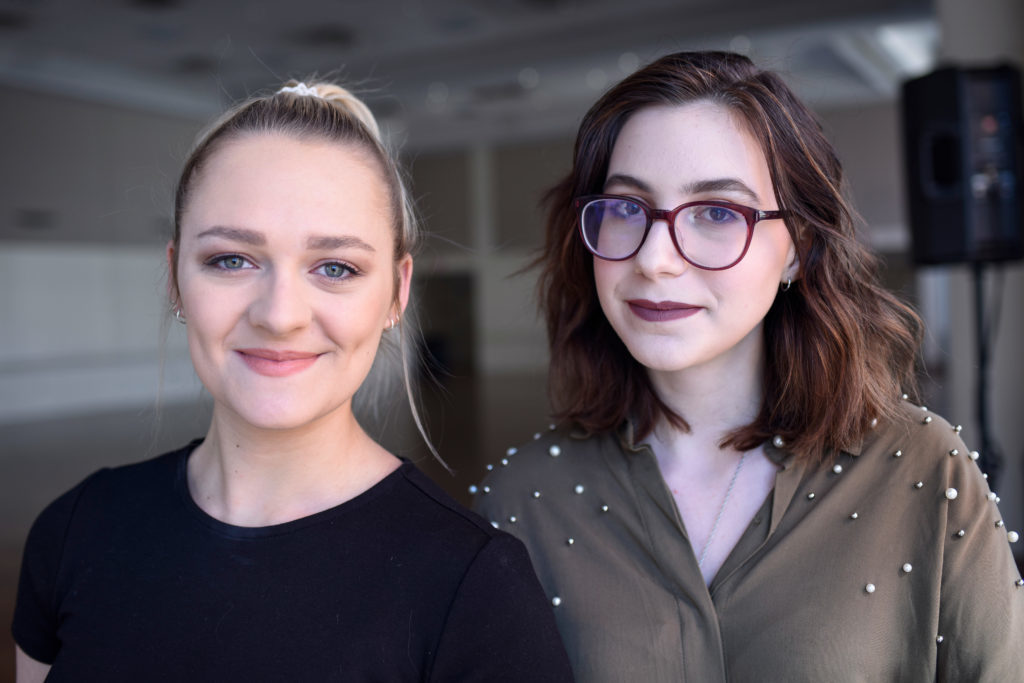When freshman Shira Strongin and sophomore Taylor Kane were paired together in an intro to video production class last semester, they realized they had more in common than their political communication major.
Both students had been personally affected by rare diseases – Strongin currently lives with an undiagnosed rare illness, and Kane’s father passed away from a genetic disorder when she was just 5 years old. The connection inspired them to form RARE GW – a student organization that stands for research, advocate, reform and educate.
Leaders of the group, which was registered with the Center for Student Engagement this semester, said they want to draw attention to these diseases on campus by lobbying for federal funding to support rare disease research and holding campus events to educate students about illnesses.
Strongin lives with an undiagnosed rare disease that has caused her to have seizures and other neurovascular complications since she was a child. About 10 percent of the U.S. population is living with a rare disease, according to rare disease advocacy nonprofit Global Genes – a number Strongin said is higher than some may think.
“I think that’s a statistic that when you tell people, they take a step back and think,” she said. “The cause becomes more personal and it’s something a lot of students on GW’s campus are probably personally impacted by, even if they don’t know yet.”
Strongin is no stranger to health care advocacy. She has spoken at conferences and created her own nonprofit called Sick Chicks, a blogging site for young women with rare diseases – like herself – to share their stories.
She said RARE GW is open to anyone who knows someone affected by a rare illness or for those who want to be an ally to those dealing with these disorders.
“Anyone who wants to come is welcome,” she said. “Anyone who wants to be involved in this community, we want you. It’s pretty simple.”
Kane said she wanted to form the organization because her father died when she was 5 years old of a rare disorder that affects the protective cover of the brain’s neurons, which can cause blindness, deafness and cognitive issues.
Although Kane does not have the disease herself, she is a carrier of the recessive gene, meaning she may pass the illness along to her children and could develop minimized symptoms in the future, she said.
Kane also runs her own non-profit organization, Remember the Girls, that is dedicated to women who carry recessive illnesses and raises awareness about how carriers are affected by disorders even if they don’t have direct symptoms. She also serves as the president of GW’s chapter of Be the Match – an organization that encourages students to register for the national bone marrow registry.
Kane said bone marrow transplants are the only solution to many rare diseases.
“We thought that it would be a great idea to create a community because there are people on campus with a rare disease or either their parents or friends,” she said.
Kane said she wants the group to focus on education and advocacy events. Using her relationships with local medical facilities, like the National Institutes of Health, Kane said she plans to organize speaker and lobbying events for the group.
She said the organization wants to “piggyback” on campaigns of other organizations, like the National Organization of Rare Diseases and the Jeans for Genes campaign, and plans on making Rare Disease Day, which occurred Feb. 28, a large annual campus event with multiple speakers and panels.
Kane said she hopes the event will attract students outside the group in the pre-health and pre-med tracks.
Freshman Liz Irons, RARE GW’s vice president who also met Strongin and Kane in class, said their combined advocacy work “sold me from day one.”
Irons said her experience watching her mother suffer health battles, like cancer and hip problems, inspired her to become an advocate, and she hopes to pursue a career affecting and writing health care policy.
“I think my goal was to have this experience from high school and transfer it to college into a more advocating kind of role and to use my knowledge to share the lessons I’ve learned,” she said.
The group is now focused on getting the word out about the new organization. They have already created a Facebook page and an OrgSync account, although no official start date for the organization has been announced. The Facebook page had attracted 25 likes as of Wednesday.
“I’m getting a lot of emails through that, so that is very promising,” Irons said. “I’m definitely looking forward to having events with Shira and Taylor and reaching out to really get the org rolling.”





